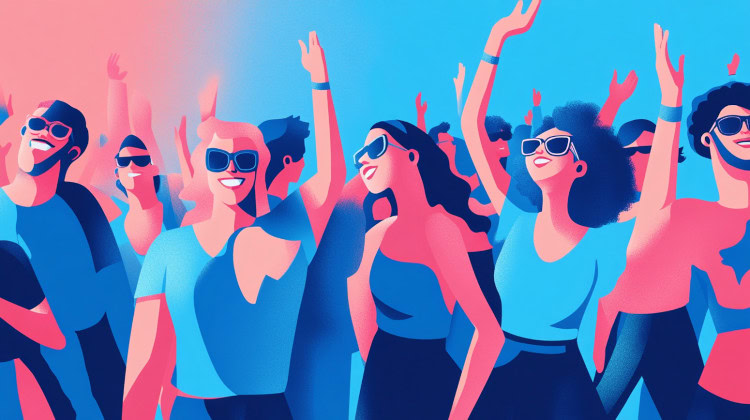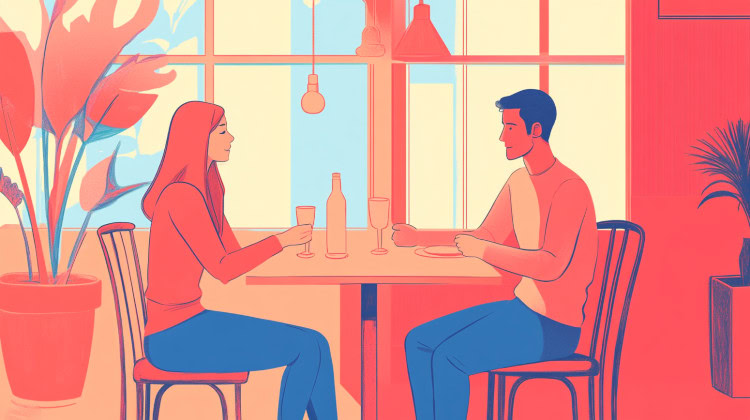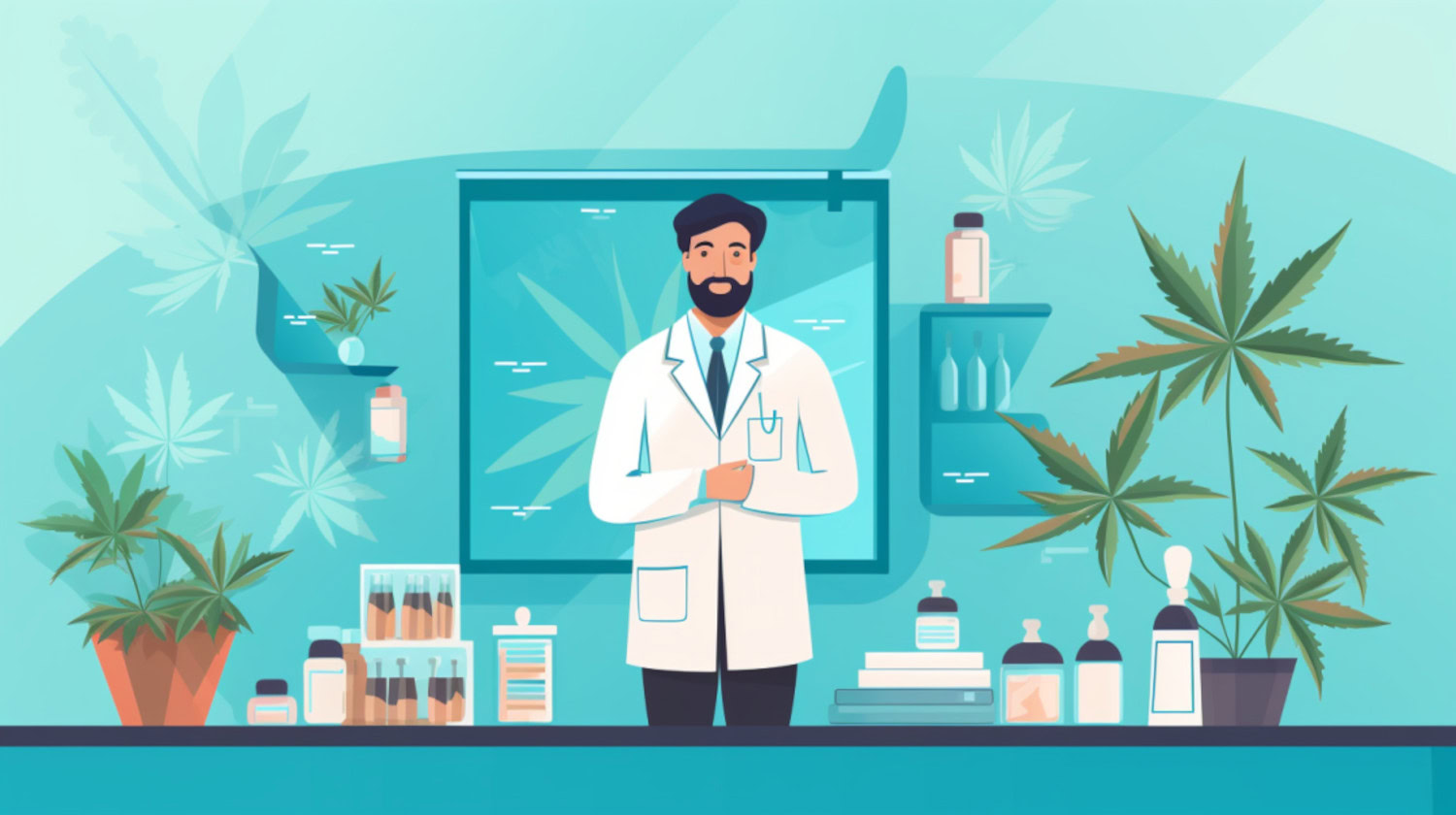In This Article
- What is Anxiety?
- How is Anxiety Typically Treated?
- How is Cannabis Used to Treat Anxiety?
- THC for Anxiety
- CBD for Anxiety
- CBD Products for Anxiety Relief
- Best Terpenes for Anxiety
- Best Cannabinoids for Anxiety
- Can You Get a Medical Card for Anxiety?
- Potential Interactions Between Cannabis and Anxiety Medications
- Cannabis and SSRIs (Lexapro, Zoloft, Prozac, Paxil)
- Cannabis and Benzodiazepines (Xanax, Klonopin, Ativan, Valium)
- Cannabis and SNRIs (Effexor, Cymbalta)
- Cannabis and Kava or Kratom
- References
Key Takeaways
- Cannabis can interact with anxiety medications, potentially enhancing, diminishing, or altering their effects.
- Some interactions, such as increased sedation or the risk of serotonin syndrome, may pose serious health risks.
- For safety, consult a healthcare provider before combining cannabis with prescription anxiety medications.
Anxiety disorders affect millions of people worldwide, and in the US, nearly 17% of all adults use prescription medications for their mental health. An earlier survey found that over 8% were using a group of medications that included anxiety treatments. Alternative therapies, including cannabis, are increasingly used as a natural approach to this common disorder. But can you smoke marijuana with anxiety medications?
The combination of cannabis with anxiety medication can lead to unwanted interactions that may change the efficacy of how these drugs work or cause adverse effects.
Knowing how your prescription medication may interact with cannabis should be part of your anxiety management plan. Whether your prescription is for selective serotonin reuptake inhibitors (SSRIs), benzodiazepines, serotonin-norepinephrine reuptake inhibitors (SNRIs), or buspirone, there are interactions, potential risks, and safety considerations.
What is Anxiety?
Everyone feels anxious now and then. A racing heart, feeling tense, or sweating is how the body naturally reacts to stressful situations. Once the event is over, the body returns to normal.
Anxiety becomes a mental health condition when persistent feelings of worry, nervousness, or fear begin to interfere with daily life. The physical and cognitive responses to stress persist, with or without cause. Job performance, schoolwork, and relationships may be affected.
Common forms of anxiety disorders include generalized anxiety disorder (GAD), panic disorder, social anxiety disorder, and specific phobias.
How is Anxiety Typically Treated?

Anxiety treatment may include a combination of therapy, lifestyle modifications, and medication.
There are classes of anti-anxiety medicines based on their type and mechanism of action, or how they control symptoms. The most commonly prescribed drugs include benzodiazepines (e.g., Xanax, Ativan, Klonopin, Valium), selective serotonin reuptake inhibitors (SSRIs) (e.g., Lexapro, Zoloft, Prozac, Paxil), serotonin-norepinephrine reuptake inhibitors (SNRIs) (e.g., Effexor, Cymbalta), and buspirone (Buspar).1
How is Cannabis Used to Treat Anxiety?

Cannabis and cannabis products help some patients ease certain anxiety symptoms, as they promote relaxation and improve mood. However, effects vary depending on the strain, dosage, and individual response. One’s success in using cannabis to manage stress and social anxiety may depend on choosing the right mix of cannabinoids and terpenes.
THC for Anxiety
Smoking a joint or taking an edible can be a great way to relax. THC can help calm anxiety, but for some, it can also worsen feelings of nervousness, agitation, or paranoia. Cannabis that contains high levels of THC may trigger anxiety symptoms for some users.2 To avoid this discomfort, using a strain lower in THC and/or in smaller doses may help with anxiety without unwanted symptoms.
CBD for Anxiety
Using CBD for anxiety is the most popular route of cannabis treatment for anxiety relief. CBD (cannabidiol) is a major cannabinoid known for its calming effects without intoxication. Research suggests that CBD may help regulate stress responses and reduce anxiety symptoms by interacting with serotonin receptors. Many patients prefer CBD products for anxiety treatment due to their non-intoxicating nature and lower risk of adverse effects compared to THC.
CBD Products for Anxiety Relief
Since CBD is widely available, it’s an accessible product for many to treat anxiety issues. CBD comes in various forms, including oils, tinctures, edibles, capsules, and topical applications. Popular products include full-spectrum CBD oil, broad-spectrum CBD, and CBD isolates. Some patients prefer CBD gummies for anxiety relief as they provide a controlled dosage and longer-lasting effects.
Best Terpenes for Anxiety
Terpenes are aromatic compounds that give cannabis its unique scent and aroma. They also influence the effects on the body and mind. Some terpenes have been linked to potential anxiety relief, adding therapeutic benefits to cannabis.
Lavender's scent is used in aromatherapy and topical products to promote calm and better sleep. It’s effective because lavender contains high amounts of the terpene linalool, one of the most well-known terpenes for relaxation. In cannabis, cultivars high in linalool may promote relaxation and help alleviate stress-related anxiety.
Another significant terpene for anxiety relief is myrcene, which has sedative effects. Myrcene is often present in indica-dominant strains and contributes to the "couch-lock" sensation that some users experience. This terpene may help with restlessness and tension, making it beneficial for individuals seeking relaxation before bedtime.
Limonene, a citrus-scented terpene found in citrus peels, can also relieve anxiety. Limonene may help reduce stress and elevate mood, making it a valuable component for individuals who need a daytime anxiety-relieving strain that does not induce excessive sedation.
Other terpenes, such as caryophyllene and pinene, have also been linked to anxiety relief. Caryophyllene in black pepper and cloves interacts directly with CB2 receptors, potentially providing anti-anxiety effects without intoxication. Pinene, commonly found in pine trees, may reduce anxiety and depressive behaviors. Pinene's neuroprotective and calming effects may increase when combined with linalool.
Other combinations of terpenes may enhance the entourage effect for additional anxiety relief. Research has indicated that blends of limonene, linalool, and caryophyllene may be particularly effective, as they work synergistically to reduce stress and enhance relaxation.
Choosing cannabis strains rich in these terpenes may provide targeted relief for anxiety, and experimenting with different terpene profiles can help individuals find what works best for their needs.
Best Cannabinoids for Anxiety
Cannabinoids are the active compounds in cannabis that interact with the body’s endocannabinoid system, influencing mood, stress levels, and relaxation. Some cannabinoids are particularly beneficial for individuals dealing with anxiety.
CBD (cannabidiol) is one of the most widely researched cannabinoids for anxiety relief. It helps reduce stress, promotes relaxation, and supports overall mental well-being without the intoxicating effects of THC. Many people prefer CBD because it isn’t intoxicating, making it an option for daytime anxiety management.
Another promising cannabinoid is CBG (cannabigerol), which interacts with the brain's CB1 and CB2 receptors. Some research suggests that CBG may enhance mood, reduce inflammation, and support a calm state of mind. While not as well-known as CBD, CBG has value in easing anxiety symptoms.
THCV (tetrahydrocannabivarin) is another cannabinoid that offers anti-anxiety effects, particularly in low doses. Unlike THC, which can sometimes trigger anxiety in high concentrations, THCV may have more stabilizing effects on mood when taken in moderation. Some users find that low doses of THCV provide a sense of clarity and relaxation without excessive sedation or euphoria.
Can You Get a Medical Card for Anxiety?
States regulate medical cannabis, and qualifying conditions for obtaining a medical marijuana card vary by jurisdiction. While anxiety is recognized as a qualifying condition in some states, it is not universally approved. However, millions of Americans experience anxiety, and many could be eligible for medical cannabis under their state's regulations.
Additionally, patients may qualify if their anxiety stems from another approved condition. For example, post-traumatic stress disorder (PTSD), which is a qualifying condition in nearly every state with a medical cannabis program, often includes severe anxiety symptoms. Similarly, chronic pain and insomnia, both commonly recognized conditions, frequently co-occur with anxiety. These overlapping symptoms may make it possible for patients with anxiety to obtain a medical marijuana card under those conditions.
Potential Interactions Between Cannabis and Anxiety Medications

Cannabis and SSRIs (Lexapro, Zoloft, Prozac, Paxil)
SSRIs increase serotonin levels to improve mood and reduce anxiety. When combined with cannabis, SSRIs can deepen sedation, fatigue, and create a potential risk of serotonin syndrome, a serious condition characterized by confusion, muscle rigidity, and fever.
Lexapro and Cannabis
Studies on using Lexapro and cannabis together are limited, but there are potential side effects. Combining these substances may increase the risk of cough, diarrhea, fatigue, and dizziness. Additionally, both cannabis and Lexapro can cause drowsiness; using them together might amplify this effect, impairing activities that require alertness, like driving.
Zoloft and Cannabis
The simultaneous use of Zoloft and cannabis may cause heightened risks of confusion, dizziness, drowsiness, and difficulty concentrating. Elderly individuals, in particular, may experience impaired thinking, judgment, and motor coordination when using both substances concurrently.
Potential Risks of Combining Cannabis with SSRIs
Cannabis may inhibit enzymes responsible for metabolizing SSRIs. This can lead to increased serotonin levels in the brain, raising the risk of serotonin syndrome—a potentially life-threatening condition with symptoms such as agitation, hallucinations, rapid heart rate, and fluctuations in blood pressure.
Considerations for CBD Use with SSRIs
CBD (cannabidiol), a non-psychoactive cannabinoid, is popular for anxiety relief. However, CBD can inhibit the enzyme CYP2C19, which metabolizes SSRIs like Zoloft. This interaction may increase medication concentrations in the bloodstream, potentially intensifying side effects such as drowsiness.
Cannabis and Benzodiazepines (Xanax, Klonopin, Ativan, Valium)
Benzodiazepines enhance GABA activity, producing a sedative effect. Combining them with cannabis can lead to excessive drowsiness, dizziness, and impaired cognitive function. Do not use alcohol with benzodiazepines, since it may further depress the central nervous system, leading to coma or death.
Xanax (Alprazolam) and Cannabis
Both Xanax and cannabis are central nervous system depressants. They can amplify effects like dizziness, drowsiness, and impaired motor coordination when used together. This combination may also lead to confusion and difficulty concentrating.
Ativan (Lorazepam) and Cannabis
Combining Ativan with cannabis can result in increased drowsiness, dizziness, and impaired judgment. Both substances can cause sedation, and their combined use can cause excessive sleepiness.
Valium (Diazepam) and Cannabis
Both Valium and cannabis can cause drowsiness, sedation, and respiratory depression. Combined, these effects may intensify, leading to slowed breathing, reduced heart rate, and even loss of consciousness. Additionally, both substances can impair motor skills and coordination, increasing the risk of accidents.
Klonopin (Clonazepam) and Cannabis
Combining Klonopin with cannabis can lead to enhanced side effects such as dizziness, drowsiness, and difficulty concentrating. Some individuals may also experience impairment in thinking and judgment.
Cannabis and SNRIs (Effexor, Cymbalta)
SNRIs regulate serotonin and norepinephrine levels. Cannabis use alongside SNRIs can result in increased heart rate, blood pressure changes, and potential worsening of anxiety symptoms in some users.
Cannabis and Effexor
Using Effexor (venlafaxine) together with cannabis may amplify side effects such as dizziness, drowsiness, confusion, and difficulty concentrating. Combining cannabis with venlafaxine can result in a fast heartbeat and increased drowsiness, particularly in individuals who have recently started taking venlafaxine. Some individuals, especially the elderly, may also experience impairment in thinking, judgment, and motor coordination.
Cannabis and Buspirone (Buspar)
Buspirone is a non-benzodiazepine anxiolytic that affects serotonin and dopamine levels. It is often prescribed for generalized anxiety disorder and differs from benzodiazepines in that it does not have sedative or addictive properties.
Buspirone and cannabis both affect the central nervous system. When used together, they can have additive effects, leading to excessive drowsiness, dizziness, and cognitive impairment.
Although rare, combining central nervous system depressants like buspirone and cannabis could potentially exacerbate respiratory depression in sensitive individuals.
Cannabis and Kava or Kratom
Although Kava and Kratom are both plant-based, they do pose possible risks when combined with cannabis.
Kava and Cannabis
Kava, derived from the roots of the Piper methysticum plant native to the South Pacific islands, has been traditionally used for its calming effects, particularly in alleviating anxiety and stress. Its active compounds, known as kavalactones, interact with neurotransmitter systems to promote relaxation.
Both kava and cannabis have sedative properties. When used together, they may amplify effects such as drowsiness, dizziness, and impairment of cognitive and motor functions.
There have been reports linking kava use to liver toxicity, especially when consumed in high doses or over extended periods. Combining kava with other substances that affect liver function, including certain medications or alcohol, could exacerbate this risk.
Kratom and Cannabis
Kratom (Mitragyna speciosa) is a tropical tree native to Southeast Asia, traditionally used for its stimulant and pain-relieving effects. Its primary active compounds, mitragynine and 7-hydroxymitragynine, interact with opioid receptors in the brain, leading to effects that vary based on dosage. At lower doses, kratom may act as a stimulant, increasing energy and alertness; at higher doses, it may have sedative effects, providing pain relief and relaxation.
Kratom's interaction with opioid receptors can lead to stimulant or sedative effects depending on the dose. This interaction also may pose addiction issues for some.
References
- MedlinePlus. Anxiety. MedlinePlus. Published May 22, 2020. https://medlineplus.gov/anxiety.html ↩︎
- Ruehle S, Rey AA, Remmers F, Lutz B. The endocannabinoid system in anxiety, fear memory and habituation. Journal of Psychopharmacology. 2011;26(1):23-39. doi:https://doi.org/10.1177/0269881111408958 ↩︎
The information in this article and any included images or charts are for educational purposes only. This information is neither a substitute for, nor does it replace, professional legal advice or medical advice, diagnosis, or treatment. If you have any concerns or questions about laws, regulations, or your health, you should always consult with an attorney, physician or other licensed professional.




